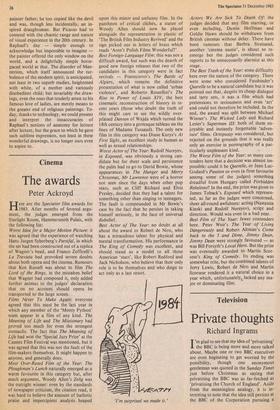Cinema
The awards
Peter Ackroyd
Here are the Spectator film awards for 1983. After months of fevered argu- ment, the judges emerged from the Starlight Room, Hammersmith Palais, with the following list:
Worst Idea for a Major Motion Picture: it was agreed that the experience of watching Hans Jurgen Syberberg's Parsifal, in which the set had been constructed out of a replica of Wagner's head, and Franco Zeffirelli's La Traviala had provoked severe doubts about both opera and the cinema. Rumours that Ken Russell was about to film The Lord of the Rings, in the mistaken belief that Wagner had composed it, only added further animus to the judges' declaration that on no account should opera be transported to the large screen.
Films Never To Make Again: everyone agreed that this must be the last year in which any member of the 'Monty Python' team appear in a film of any kind. The Meaning of Life and The Missionary had proved too much for even the strongest stomachs. The fact that The Meaning of Life had won the 'Special Jury Prize' at the Cannes Film Festival was mentioned, but it was agreed that this was not the fault of the film-makers themselves. It might happen to anyone, and generally does.
Most Over-Rated Film of the Year: The Ploughman's Lunch naturally emerged as a warm favourite in this category but, after much argument, Woody Allen's Zelig was the outright winner: even by the standards of newspaper criticism, the citation read, it was hard to believe the amount of bathetic praise and impercipient analysis heaped
upon this minor and unfunny film. In the pantheon of critical clichés, a statue of Woody Allen should now be placed alongside the representation in plastic of `The British Film Industry Revived' and the sign picked out in letters of brass which reads 'Aren't Polish Films Wonderful?' Best Foreign-Language Film: this was not a difficult award, but such was the dearth of good new foreign releases that two of the candidates in this category were in fact revivals — Pontecorvo's The Battle of Algiers, which remains the definitive presentation of what is now called 'urban violence', and Roberto Rossellini's The Rise to Power of Louis XIV, the best cinematic reconstruction of history in re- cent years (those who doubt the truth of this might care to see the wildly over- ptaised Dan ton of Wajda which turned the 18th century into a grotesque tableau on the lines of Madame Tussaud). The only new film in this category was Diane Kurys's At First Sight, an excellent study in human as well as sexual relationships.
Worst Actor of The Year: Rudolf Nureyev, in Exposed, was obviously a strong can- didate but for sheer scale and persistence the palm had to go to David Bowie, whose appearances in The Hunger and Merry Christmas, Mr Lawrence were of a horror not seen since the days when other pop stars, such as Cliff Richard and Elvis Presley, decided that they had a talent for something other than singing to teenagers. The fault is compounded in Mr Bowie's case by the fact that he persists in taking himself seriously, in the face of universal disbelief.
Best Actor of The Year: no doubt at all about the award to Robert de Niro, who has a miraculous talent for physical and mental transformation. His performance in The King of Comedy was excellent, and should stand as a model to all those American `stars', like Robert Redford and Jack Nicholson, who believe that their only role is to be themselves and who deign to act only as a last resort.
`I'm surprised we made it.' Actors We Are Sick To Death Of the judges decided that any film starring, or even including, Dustin Hoffman and Goldie Hawn should be withdrawn from British cinemas without delay. There have been rumours that Barbra Streisand, another 'cinema nastie', is about to re- emerge but the judges considered such reports to be unnecessarily alarmist at this stage, The Best Trash of the Year: some difficulty here over the nature of the category. There were some who considered Fassbinder's Querelle to be a natural candidate but it was pointed out that, despite its cheap dialogue and tatty sets, it was a film which had pretensions to seriousness and even 'art' and could not therefore be included. In the end, the award was split between Michael Winner's The Wicked Lady and Richard Lester's Superman III: both of them en- joyable and instantly forgettable 'adven- ture' films. Octopussy was considered, but rejected on the grounds that it was really only an exercise in pornography of a par- ticularly unpleasant kind.
The Worst Film of the Year: so many con- tenders here that a decision was almost im- possible: could it be Querelle, or Jean Luc- Godard's Passion or even (a firm favourite among some of the judges) something dreadful from Hungary called Forbidden Relations? In the end, the prize was given to James Toback's Exposed which represen- ted, as far as the judges were concerned, sheer all-round awfulness: acting (Nastassia Kinski and Rudolf Nureyev), script and direction. Would win even in a bad year. Best Film of The Year: fewer contenders here. Peter Weir's The Year of Living Dangerously and Robert Altman's Come back to the 5 and Dime, Jimmy Dean, Jimmy Dean were strongly favoured — as was Bill Forsyth's Local Hero. But the prize was eventually awarded to Martin Scor- sese's King of Comedy. Its ending was somewhat trite, but the combined talents of Jerry Lewis, Robert de Niro and Martin Scorsese rendered it a natural choice in a year which, unfortunately,, lacked any ma- jor or dominating film.














































 Previous page
Previous page